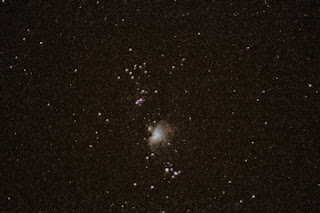Jan 29th 1600 GMT
The waxing gibbous moon was low in the east, as the Sun was
close to setting. Tycho and its rays were showing well and there were some
lunar craters in the south. As it was two days before full, Grimaldi was not
visible. It was a shame that the biggest lunar eclipse for years would not be
visible from the UK.
Jan 29th 1535 GMT
I bin scanned the Sun but did not see any sunspots.
January 20th 1050 GMT
I checked the Sun in hydrogen alpha light but found it quiet. There seemed to be some surface shading and a small filament. I had to view from indoors, due to a cold.
January 19th 0920 GMT
I checked the Sun in hydrogen alpha light but found it bland
and featureless.
January 18th 2010 GMT
I had a quick look outside with my binoculars in a clear sky. The Orion Great Nebula (M42) was very prominent and some outlying fainter regions were visible that I'd never seen before. I couldn't count the Pleiades (M45) as I could see so many. It was the same with the Hyades, although I needed to sweep from side to side to see the whole cluster.
January 18th 0640 GMT
I took three 30 second exposures of the Pole Star at 300mm
focal length and ISO 6400 and 12 dark frames. I processed using Deep Sky Stacker and GIMP.
January 17th 1150 GMT
I had a brief opportunity to check the Sun through my binoculars and filters and saw two small sunspots.January 16th 1100 GMT
Finally, a sunspot was present on the SOHO images and I had some clear sky, well clear-ISH! As there was moving cloud, I was unable to try a telescope and camera (my preferred method), so used a binocular scan instead. I did not find the sunspot, though.
January 6th 2040 GMT
The Pleaides did not stack in Deep Sky Stacker, despite taking 21 dark frames. I stacked 11 frames in Microsoft ICE instead and finished in GIMP.
I managed to stack M42 with Deep Sky Stacker.
No luck with either M35 nor M41 but I stacked eight frames of Alcor and Mizar.
January 5th 2110 GMT
I tried snapping the north polar region at 300mm focal
length, ISO 800 and 3 minutes exposure. It did not come out as hoped, as it showed star trailing.
January 5th 0835 GMT
There was some moving cloud, with clear patches. I took some
shots of the Moon with my DSLR at the same settings as 3rd.
January 3rd 0640 GMT
There
was still moving cloud after a storm but moonlight was getting through
sometimes. I took some full disc shots with my DSLR at 300mm focal length, ISO
100 and 1/2000 second exposure.
January 1st 1315
I
checked the Sun with my PST. The solar disc was bland but I was unable to
photograph it but my camera had stopped working, hopefully not for good.








No comments:
Post a Comment